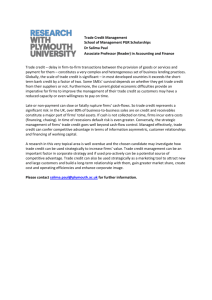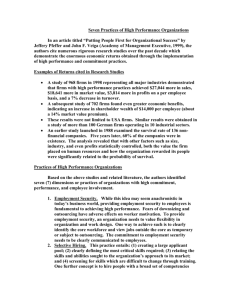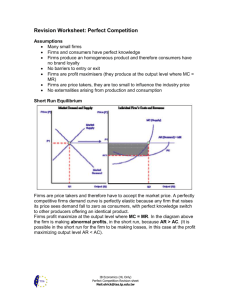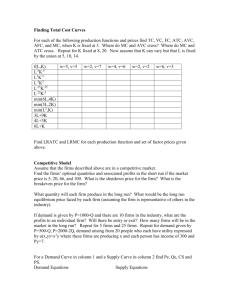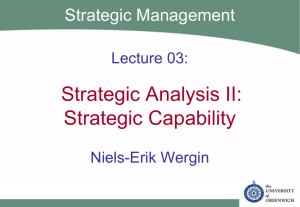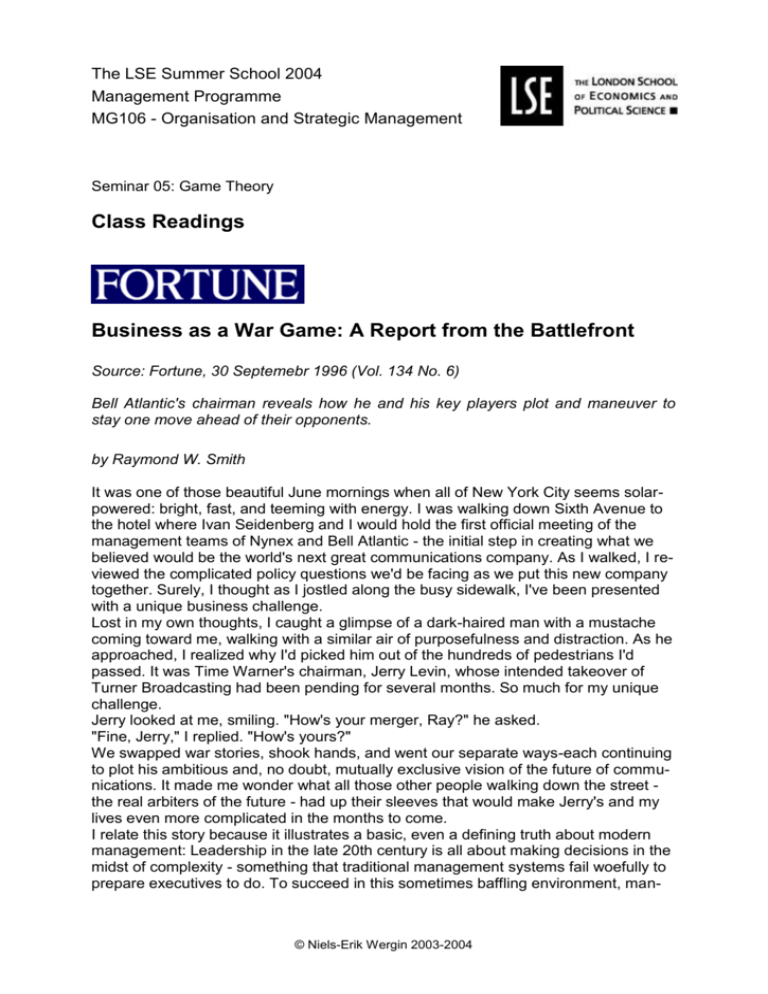
The LSE Summer School 2004
Management Programme
MG106 - Organisation and Strategic Management
Seminar 05: Game Theory
Class Readings
Business as a War Game: A Report from the Battlefront
Source: Fortune, 30 Septemebr 1996 (Vol. 134 No. 6)
Bell Atlantic's chairman reveals how he and his key players plot and maneuver to
stay one move ahead of their opponents.
by Raymond W. Smith
It was one of those beautiful June mornings when all of New York City seems solarpowered: bright, fast, and teeming with energy. I was walking down Sixth Avenue to
the hotel where Ivan Seidenberg and I would hold the first official meeting of the
management teams of Nynex and Bell Atlantic - the initial step in creating what we
believed would be the world's next great communications company. As I walked, I reviewed the complicated policy questions we'd be facing as we put this new company
together. Surely, I thought as I jostled along the busy sidewalk, I've been presented
with a unique business challenge.
Lost in my own thoughts, I caught a glimpse of a dark-haired man with a mustache
coming toward me, walking with a similar air of purposefulness and distraction. As he
approached, I realized why I'd picked him out of the hundreds of pedestrians I'd
passed. It was Time Warner's chairman, Jerry Levin, whose intended takeover of
Turner Broadcasting had been pending for several months. So much for my unique
challenge.
Jerry looked at me, smiling. "How's your merger, Ray?" he asked.
"Fine, Jerry," I replied. "How's yours?"
We swapped war stories, shook hands, and went our separate ways-each continuing
to plot his ambitious and, no doubt, mutually exclusive vision of the future of communications. It made me wonder what all those other people walking down the street the real arbiters of the future - had up their sleeves that would make Jerry's and my
lives even more complicated in the months to come.
I relate this story because it illustrates a basic, even a defining truth about modern
management: Leadership in the late 20th century is all about making decisions in the
midst of complexity - something that traditional management systems fail woefully to
prepare executives to do. To succeed in this sometimes baffling environment, man-
© Niels-Erik Wergin 2003-2004
agers have to devise dynamic new systems to assist them. These systems must do
the following:
They have to give managers a way of analyzing the impact of conflicting,
sometimes contradictory market forces.
They have to eliminate the blind spots that prevent managers from seeing all
the consequences of their decisions.
They have to help managers change direction as the environment changes.
And they have to do all this in real time, so that the organization remains limber enough to move at exactly the right strategic moment-and not a moment
later.
The closest analog to this kind of system was devised not in the hothouse atmosphere of the business school but rather in the life-and-death crucible of World War II.
That's when British navy officers first applied the academic exercise known as game
theory to the deadly serious pursuit of trying to outwit German submarine commanders. They developed techniques for analyzing different scenarios, exploring interdependencies, and changing strategies midcourse - all while the action was unfolding
around them. In the process, they formed the kind of flexible decision- making structure required in the modern corporation.
To make effective use of game theory, organizations must learn to analyze, adjust,
even change direction in midflight, without losing the sense of purpose and action required in the competitive world. At Bell Atlantic, we've found that the lessons of game
theory give us a wider view of our business situation and provide us a more nimble
approach to corporate planning. We call this system, quite simply, the "manage the
business" process.
Several techniques and modes of strategic thinking are central to this system:
Look for solutions that will be correct no matter what happens.
If you make all your investment and marketing decisions based on a single view of
the future, you put your company at risk if your assumptions turn out to be invalid. On
the other hand, if you make a decision that is correct across a wide range of outcomes, you reduce your risk while maximizing your exposure to growth opportunities.
This is the principle we've used at Bell Atlantic in making decisions about modernizing our telephone plant. We know that, like every telephone company, we have to
upgrade our old copper plant with fiber optics and other broadband technologies. We
also know that interactive applications are driving the market and that the costs of
high-speed lines and other digital technologies are dropping dramatically. However,
we don't know precisely how digital content will be delivered. We don't know exactly
what the product mix will be - PCs? digital TVs? the new Internet appliances? - or
what people will pay for them. And we don't know how digital technologies will become an affordable, mass-market phenomenon.
So rather than commit our capital dollars to a limited technology platform that will be
correct based on only one reading of the tea leaves, we have opted to deploy a flexible, full-featured digital network that will deliver high-speed interactive content in any
form-data, video, or voice. Meanwhile, we're covering all the bases by supplementing
our existing network with new digital technologies and by entering new markets
quickly with low-cost, easily deployed technologies such as wireless video. With this
flexible strategy, we are in a position to win, no matter how the market develops.
Build a constant reassessment of business assumptions into the planning process.
© Niels-Erik Wergin 2003-2004
Most successful executives are temperamentally unsuited to second-guessing their
own decisions; once they set out on a certain path, they become emotionally invested in their own assumptions and come to believe that further analysis breeds waffling
and indecision. But by establishing an independent review process, you can ensure
that your managers are taking changing conditions into account in their plans.
At Bell Atlantic we call this "performance assurance." A senior-level executive is given the responsibility for monitoring our progress on our top 20 or 30 corporate priorities. This highly respected executive works with the operating units to revisit goals
and targets, track progress, analyze problems, and basically keep us from marching
resolutely down blind alleys. If this executive is carefully selected and performs the
task without regard to politics, the operating managers come to regard him or her as
a built-in sanity check who helps keep the organization focused and aligned.
Analyze the game through the other players' eyes.
This is a pure game-theory strategy - placing yourself in the shoes of your opponents
to understand how they will counter your tactical moves. It is especially important in
preventing the tunnel vision that results in a too narrow focus on a single competitor;
while you're concentrating on the headlights of the Mack truck coming down the
highway, you sometimes don't see the guy on the motorcycle trying to cut you off
from the right lane.
There are a number of techniques that can improve a company's competitive instincts. We've used three in particular:
Fishbowl. This exercise brings everybody with an ax to grind on a given issue
together in one room, with advocates of certain points of view in the center of
the "fishbowl" and executives accountable for the decision on the outside. The
experts present their data and debate one another, while the executives evaluate the quality of the facts at hand, expose weak positions, and analyze the
strategic options.
Red team / blue team. In this variation of the classic war game, we assign
managers to teams representing major competitors and have them plan the
strategies they would use to beat us. This team research increases our competitive intelligence and quickens our reflexes by building a competitive
awareness into all our actions - rather like a good chess player is always
aware of what an opponent will do in response to the next move.
Future mapping. This is a fancy name for a way of looking at different scenarios for the future. We look at several alternative futures, or "end states," for our
business, assign a probability to each one, and identify the forces that will determine whether that scenario will happen. The key is to select those actions
with the biggest returns, the least risk, or both. Knowing that we can't manage
every single variable, we're trying to make sure we're concentrating on those
that will give us the most bang for the buck.
Don't just play the game, change the rules.
In their new book, Co-opetition, professors Adam Brandenburger and Barry Nalebuff
say, "Successful business strategy is about actively shaping the game you play, not
just playing the game you find." Or, in a more Zenlike phrase: "There is always a
larger game."
© Niels-Erik Wergin 2003-2004
Traditional planning models lock managers into assumptions that they find difficult to
change. But the "manage the business" process constantly prompts managers to
question those underlying assumptions. For example, we asked ourselves several
years ago why telephone companies couldn't own the content transmitted over our
networks - from directory listings to digitized movies - when our competitors, most notably the cable companies, could. Left unchallenged, this outdated legalism would
have severely hampered our ability to compete. So we decided to play the "larger
game," arguing that the ban on selling our own content on our networks violated our
First Amendment rights. We won - and changed the scope of the competitive game
for telephone companies forever.
This fundamental redefinition of our business would not have been possible unless
we had a systematic way of reviewing the initial conditions that shape our destiny.
This willingness to see ourselves afresh has resulted in a large number of strategic
initiatives, from joint ventures to mergers to new-business development, that would
have been unheard of in a traditional planning environment. We still have to deliver
the goods in the marketplace, but at least we've put ourselves in a position to play
the game - which, ultimately, is what successful strategic planning is all about.
Of course, having the right planning process is only half the story. The game-theory
approach to business strategy also requires a different kind of corporate manager:
flexible, intellectually rigorous, and highly tolerant of ambiguity. It takes a special kind
of manager to revisit decisions constantly and reverse course, even at the risk of
personal embarrassment and exposure.
It also takes a special kind of company to nurture a climate of open, frank, and relentlessly objective discussion so that all the variables are scrutinized honestly and without political repercussions. The loyalty required in this system differs subtly but crucially from the loyalty that prevails in most hierarchical organizations. This is loyalty
not to one's own advancement or one's boss or one's department, but to the truth as
it bears on the goals of the organization.
Finally, the success of a dynamic planning process, one that is constantly presenting
managers with new and unfamiliar choices, boils down to what I call the "shortstop
rule": Know what to do with the ball when someone hits it your way. A modern manager must have the vision, skill, and competitive reflexes to throw to the right base at
the right time, without looking at the first-base coach for help. In the last analysis, the
game-theory approach to business strategy challenges corporate leaders to build not
only a different kind of system but a different kind of team.
© Copyright 2002 Time Inc. All rights reserved.
© Niels-Erik Wergin 2003-2004
Let Game Theory Begin: Anticipating Your Rival
Source: Investor's Business Daily, 25 January 1996
by Gerald A. Achstatter
Anticipating your opponent: It's key to any sport or business. But unlike sports, where
there's a winner and loser, you can have win-win and lose-lose situations in business.
When the competition views your actions as beneficial or at least nonthreatening, it's
less likely to retaliate. Conversely, seeing your competitors' actions in the same light
can avert a costly price war. Visualizing and anticipating your competitor's moves are
the venue of a branch of mathematics called game theory - the study of competitive
interaction. Companies use it to anticipate their competitors' reactions in order to improve their own decisions.
Last March, the Federal Communications Commission completed the largest application of game theory - the $ 7 billion auction of wireless personal communication services.
Game theory helps firms better assess their own negotiating position. They can also
learn how to change the game they're playing rather than just play the existing one.
Having game theory in your corporate ''bag of tricks'' can mean the difference between success and failure. ''Our company only gets to bid on deals once in a generation,'' said Dallas Luby, executive vice president and chief marketing officer at Stamford, Conn.-based General Re Corp., a property/casualty reinsurer. ''We want the
best information possible.''
Game Theory also can help firms look beyond the traditional roles of competitors,
customers and suppliers, says Barry J. Nalebuff, management professor at the Yale
School of Management and author of the forthcoming book on game theory, ''Coopetition'' (co-authored by Adam M. Brandenburger, business strategy professor at
the Harvard Business School). Too often, firms ''leave out complementors.''
''Sometimes, what you do helps me,'' Nalebuff added. An example is the development of a new airplane. They are ''too expensive for one firm to have/develop alone.
Airlines share the development cost.''
It's important to note, however, that firms must avoid collusion.
Another reason game theory is catching on is that firms don't want to be at a competitive disadvantage because they failed to use the tool. At General Re, ''Game theory is a significant part of senior management education,'' Luby said.
The real benefit of game theory is finding areas of cooperation, Luby adds. It helps
answer the question: ''What's everybody's motivation in the game?''
© Niels-Erik Wergin 2003-2004
Allocentrism - putting yourself in your competitor's shoes - is only one side of the
equation. Firms must also look at the added value they bring to the table, Nalebuff
says. The Holland Sweetener Co. probably wishes it had done so. It tried to compete
with Monsanto's aspartame product, NutraSweet, by building a plant to make the
product.
All Holland Sweetener succeeded in doing was to make the aspartame market competitive. Coca Cola Co. and PepsiCo Inc. signed long-term contracts with Monsanto
prior to the patent expiration on NutraSweet. They both did so at significantly lower
prices.
As it turned out, the NutraSweet name had a great deal of value to both Coke and
Pepsi something Holland Sweetener couldn't capitalize on.
The absence of any added value doesn't preclude a company from playing in the
game, Nalebuff says. But if you don't have added value, ''You had better realize it
and get paid upfront.''
By creating a viable competitor for NutraSweet, Holland Sweetener certainly did
Coke and Pepsi a great service. But there are instances when game theory ''is not
beneficial to anyone,'' said Avinash K. Dixit, economics professor at Princeton University. In designing the FCC's PCS auction, the government worked hard to ensure
productive bidding. The reason? ''Each bidder could have benefited from lying in the
grass,'' said Evan R. Kwerel, senior economist at the FCC.
The auction consisted of 112 rounds of open bids. To prevent disruptive bids, each
bidder was required to maintain active participation in the auction, Kwerel says. In
addition, firms that withdrew bids were subject to penalties.
Like the bids in the FCC auction, the actions firms take are interpreted by their competitors as signals. They convey what's important to the company.
''Firms may give false signals'' to confuse competitors, Dixit said. ''But other firms will
not give much weight to signals that can easily be mimicked.''
Game theory helps sensitize companies to such actions as false signaling. ''It safeguards you from being taken advantage of,'' Dixit said.
So what's in store for game theory? ''There will be more cooperation between buyer
and seller than you've ever seen before,'' Luby said. As a result, ''more and more
people are going to use game theory.'' Game theory will continue to grow because of
the importance added value plays in business today, Nalebuff says. It ''helps companies define their added value.'''
And firms will have ''to give up old habits such as thinking that business is war and
that they must beat the competition,'' Nalebuff added. ''This is true for card games
and sports, but not in business.''
© Copyright 2002 Investor's Business Daily, Inc. All rights reserved.
© Niels-Erik Wergin 2003-2004
It's only a game
Source: The Economist, 15 June 1996
"Managers have much to learn from game theory - provided they use it to clarify their
thinking, not as a substitute for business experience"
FOR old-fashioned managers, business was a branch of warfare - a way of 'capturing
markets' and 'making a killing'. Today, however, the language is all about working
with suppliers, building alliances, and thriving on trust and loyalty. Management theorists like to point out that there is such a thing as 'win-win', and that business feuds
can end up hurting both parties.
But this can be taken too far. Microsoft's success has helped Intel, but it has been
hell for Apple Computer. Instead, business needs a new way of thinking that makes
room for collaboration as well as competition, for mutual benefits as well as trade-offs.
Enter game theory.
Stripped to its essentials, game theory is a tool for understanding how decisions affect each other. Until the theory came along, economists assumed that firms could
ignore the effects of their behaviour on the actions of rivals, which was fine when
competition was perfect or a monopolist held sway, but was otherwise misleading.
Game theorists argue that firms can learn from game players: no card player plans
his strategy without thinking about how other players are planning theirs.
Economists have long used game theory to illuminate practical problems, such as
what to do about global warming or about fetuses with Down's syndrome. Now business people have started to wake up to the theory's possibilities. McKinsey, a consultancy, is setting up a practice in game theory. Firms as diverse as Xerox, an officeequipment maker, Bear Stearns, an investment bank, and PepsiCo, a soft-drinks giant, are all interested. They will no doubt seize on 'Co-opetition' (Doubleday, $ 24.95),
because it is written by two of the leading names in the field, Adam Brandenburger,
of Harvard Business School, and Barry Nalebuff, of the Yale School of Management.
It also helps by using readable case studies rather than complex mathematics.
The main practical use of game theory, say the authors, is to help a firm decide when
to compete and when to co-operate. Broadly speaking, the time to co-operate is
when you are increasing the size of the pie, and the time to compete is when you are
dividing it up. The authors also argue that, to get a full picture of their business, managers need to think about a new category of firms, 'complementers', which lead your
customers to value your products more highly than if they had only your product. Hotdog makers and Colman's mustard are complementers: buy one and you are more
likely to buy the other. So are Intel and Microsoft.
The most important thing to know about a game is who the players are. A small
change in the number of players can have unexpected consequences. The Holland
Sweetener Company, a Dutch-Japanese joint venture, discovered this to its cost in
© Niels-Erik Wergin 2003-2004
the late 1980s when it tried to break NutraSweet's monopoly of the American artificial-sweetener market. NutraSweet managed to keep the predator out, but only after
Coca-Cola and Pepsi used the threat of competition to force NutraSweet to lower its
prices.
When competition between two players benefits third parties in this way, there is
scope for the beneficiary to split its gains. Holland Sweetener in effect gave up its
share of the gains that it had helped Coke and Pepsi to win. BellSouth, a telephone
company, was wiser: it insisted on being paid to play. The firm said that it would bid
against Craig McCaw for control of LIN Broadcasting Corporation only if LIN paid it
$ 54m for entering the fray and a further $ 15m in expenses if it lost the bid.
One way for a player to do well in a game is to make itself indispensable. Nintendo
built its video-games business in the late 1980s by restricting software developers to
making five games each, keeping retailers on short rations, and doing much of the
development in-house. Nobody else had any bargaining power. By contrast, IBM
stored up trouble for itself in personal computers by allowing Microsoft and Intel to
establish a lock on the two most valuable bits of the business.
A second technique is to tempt lots of competing players into the game - for instance
by increasing the prize. That is what American Express did in 1994 when it organised
a coalition with other big companies to purchase health care. The potential contract
was so large that a host of health-care providers got into a bidding war. A third technique is to make intelligent use of a resource which is worth more to your customer
than to you. In 1993 TWA lifted itself off the bottom of the airline league by tearing
out several rows of seats that were usually empty because the carrier was so unpopular, giving passengers more leg-room - and making the airline popular once more.
When to stop playing
Game theory seems a fine way to analyse decisions retrospectively. But is it much
help in the heat of battle? The track record of grand ideas imported from other disciplines, notably chaos theory, is not impressive. However, the game theorists have already notched up some significant practical successes. The Federal Communications
Commission used the theory to help design its $ 7 billion auction of radio spectrum
for mobile phones - and hundreds of mobile-phone companies also used the theory
to formulate their bids.
But, as Peter Scott-Morgan, a consultant with Arthur D. Little, points out, game theorists are worryingly silent about the links between a company's strategy and its internal capabilities. Today's most successful managers craft their strategies on the basis
of knowledge of their own companies, and devote at least as much thought to the
question of how blueprints will be translated into practice. At their worst, game theorists represent a throwback to the days of such whiz-kids as Robert McNamara,
chairman of Ford in 1960 and later defence secretary, who thought that rigorous analytical skills were the key to success.
Yet nothing can ever substitute for deep first-hand knowledge and experience. So,
however sophisticated the games that managers play may be, they will still need to
get their hands dirty.
© 1996 The Economist Newspaper Limited. All rights reserved.
© Niels-Erik Wergin 2003-2004






